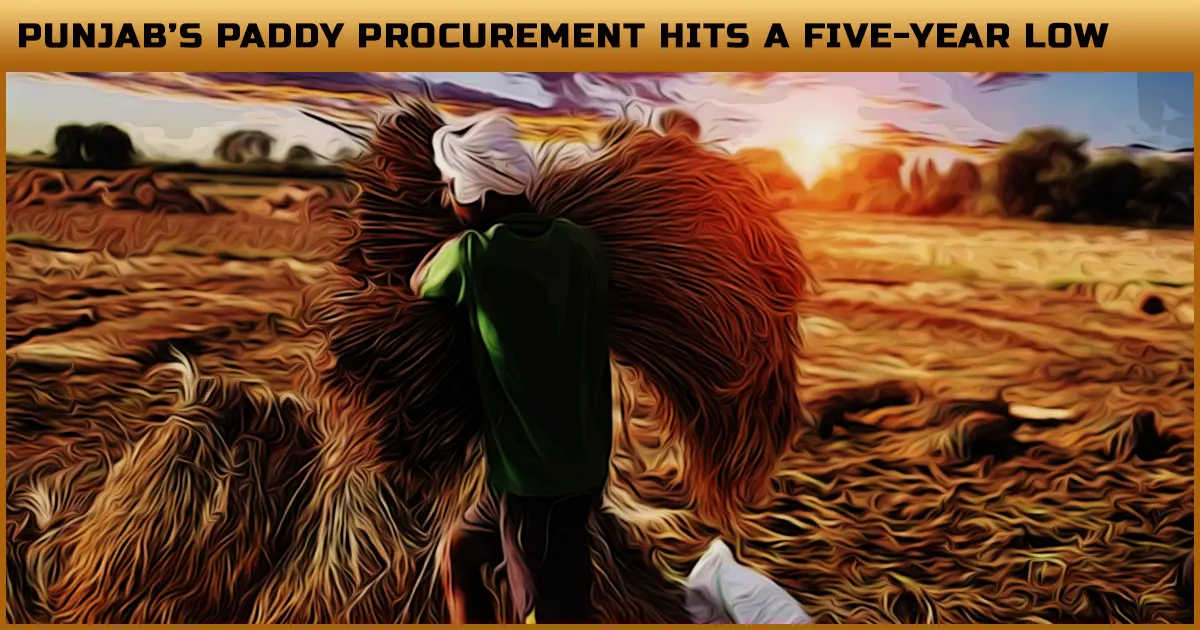
Context
Despite achieving the largest area under rice cultivation in 2024, Punjab is witnessing one of its lowest paddy procurement figures in the past five years, raising concerns about its role in India’s foodgrain supply.
Current Scenario
- Procurement Figures:
Punjab has procured 172.16 lakh metric tonnes (LMT) of paddy so far, falling short of the target of 185 LMT for the 2024-25 season. - Cultivation Area:
The procurement target was set based on approximately 32 lakh hectares of rice cultivation in the state.
Paddy Procurement Process
- Planning and Coordination:
- The Centre, in collaboration with state governments and the Food Corporation of India (FCI), devises a procurement plan before the kharif marketing season (October to September).
- Purchasing Paddy:
- State agencies and the FCI procure paddy from farmers at the Minimum Support Price (MSP) for inclusion in the central pool.
- Milling and Storage:
- Procured paddy is sent to rice mills, processed, and stored as buffer stock or allocated for welfare schemes.
- Welfare Schemes:
- The rice from paddy procurement supports welfare programs under the National Food Security Act (NFSA), ensuring food security for millions of people.
Reasons for Procurement Shortfall
- Reduced Arrivals in Mandis:
- By the end of 2024, only 50,600 tonnes of paddy reached mandis daily, compared to 6-7 lakh tonnes during peak season.
- Procurement Delays:
- Issues with rice shellers and the refusal of rice mills to store procured paddy slowed the procurement process.
- Farmer Delays:
- Farmers delayed harvesting to avoid low prices, resulting in higher moisture content in the harvested paddy.
- Impact on Yield:
- Expected yields of 30-32 quintals per acre dropped to 2-5 quintals due to higher temperatures during the grain milking stage.
- Hybrid Rice Issues:
- New hybrid rice varieties yielded a milling out-turn ratio of 60%-62%, below the FCI standard of 67%, reducing procurement.
- Labour and Arhtiyas’ Demands:
- Arhtiyas (middlemen) demanded a 2.5% higher commission, and mandi labourers protested for wage increases, further delaying procurement.
Potential Solutions for Enhancing Paddy Procurement
- Improving Coordination:
- Strengthen collaboration among procurement agencies, transportation, and storage facilities to ensure timely payments and address labour demands effectively.
- Promoting Crop Diversification:
- Encourage diversification of Punjab’s agriculture to reduce dependence on paddy cultivation and promote long-term sustainability.
- Modernising Infrastructure:
- Invest in upgrading storage and milling facilities to handle procurement delays and ensure smooth operations.
- Farmer Support:
- Provide incentives for timely harvesting and promote the use of paddy varieties with higher milling out-turn ratios.
- Addressing Labour Issues:
- Negotiate fair commissions and wages for arhtiyas and labourers to prevent disruptions in the procurement process.




